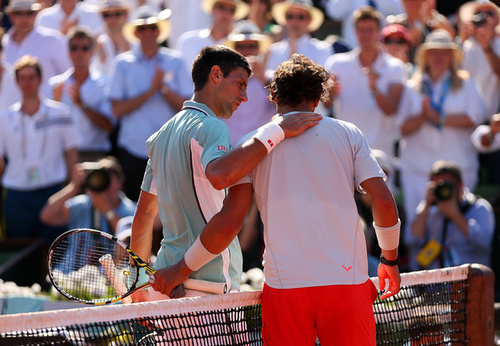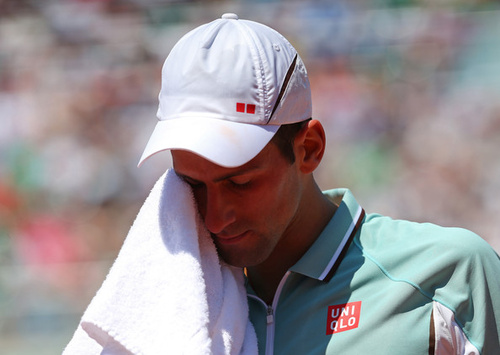Don't miss any stories → Follow Tennis View
FollowATP Turning Points of 2013: Djokovic Denied in Paris
What were the moments that defined the ATP's central trajectories this season? After traveling through Melbourne and Indian Wells, Nick Nemeroff pauses on the Paris clay.
Novak Djokovic’s 2011 season was indisputably one of the best of all time. He started the year on a 43-match winning streak, amassed an astounding 70-6 record, won three slams, and finished the season world No. 1 for the first time in his career. In addition, Djokovic finished the year 10-1 against Rafael Nadal and Roger Federer. The sole blemish came in the semifinals of the only major that he failed to win, Roland Garros, where Federer struck down the Serb’s winning streak and hope for a calendar Grand Slam.
In 2012, Djokovic started the season winning in Australia and moved one step closer to obtaining the Roland Garros title, reaching the final before losing to Nadal in four sets. After losing the first two sets, Djokovic won the third set and was up a break in the fourth set before play was halted due to rain. Nadal came back the next day, recovered the break and went on to win the set and the match.
Of all Djokovic’s close calls at Roland Garros, however, his 2013 exit was more agonizing than the rest. After breezing through his first five matches in Paris, Djokovic set up one of the most anticipated clashes of the year against Nadal in the semifinals. Many viewed this match as Djokovic’s best shot at taking down the King of Clay on his beloved red dirt. The Spaniard’s level of play had dipped far below the extraordinary level of play that carried him to his previous seven French Open titles. For both men, a semifinal victory would set up a final match against Jo-Wilfried Tsonga or David Ferrer, a match where either Djokovic and Nadal would be heavily favored.
After the two champions split the first four sets, Djokovic found himself up a break at 4-3 in the final set. At deuce in the 4-3 game, Djokovic made one of the costliest mistakes of his career. After hitting an overhead off a high, short ball, he stumbled forward, making incidental contact with the net. Chair Umpire Pascal Maria ruled that Djokovic touched the net before the ball had bounced twice, which Nadal immediately recognized. As a result, he lost the point and was down break point instead of being a point away from a 5-3 lead, and five points from the final. Nadal would go on to break in that game and even the match.

In what would be the final game of the match, at 7-8, Djokovic made two forehand errors and botched an overhead to drop the match-ending break at love. After taking out his archrival, Nadal unsurprisingly overwhelmed David Ferrer in the final to win his eighth Roland Garros title and first of two majors this year. While this tournament clearly propelled Nadal through the rest of 2013, it influenced the rest of Djokovic’s season as well.
It would be grossly unfair to speculate on Djokovic’s psyche and level of confidence following this loss, but his results indicate that his Roland Garros setback dampened him mentally. Before Roland Garros, Djokovic’s most recent title had come at Monte Carlo in April. After Roland Garros, he would not win another title until September in Beijing. His title drought spanned five months and seven tournaments.
Two of Djokovic’s more peculiar matches during that drought came at Wimbledon and Cincinnati. In the final of Wimbledon, he was defeated by Andy Murray in straight sets. Murray played an extremely solid match, but Djokovic was flat, listless, and inconsistent throughout the duration of the three sets. While Murray’s nerves surely were sky-high, Djokovic could not effectively exploit them.
In Cincinnati, the Serb was narrowly defeated by John Isner in three sets. The American failed to provide Djokovic with any rhythm, and he spent the match off balance physically and mentally. Losing 7-5 in the third set continued the odd string of his setbacks.
In a season of ups and downs, Djokovic suffered another disheartening defeat at the hands of Nadal in the final of the US Open. At one set all, he led 3-1 in the third set before dropping 11 of the final 13 games of the match. It was a remarkable plunge for someone so consistent. To his credit, Djokovic did a masterful job of closing out his season, winning titles in Beijing, Shanghai, Paris, and at the World Tour Finals. He defeated Nadal twice during that stretch in convincing fashion.
The sequence of events following the Roland Garros will surely motivate one of the most mentally resilient and passionate players that the game has ever seen. After Wimbledon, Nadal dominated on the summer hard courts where the Serb had shone for the last several years. As 2014 looms, Djokovic will not only be looking to regain supremacy on hard courts, but he will be gunning harder than ever at a Roland Garros crown. The 2013 semifinal, while certainly a defeat that Djokovic will not remember fondly, should actually provide him with a significant boost of confidence. He was six points away from handing Rafael Nadal his second defeat at Roland Garros and becoming a heavy favorite to win the only major that has eluded him.

Despite Nadal’s massive topspin, it would not be difficult to argue that Djokovic’s clay-court game is as solid as what the Spaniard can produce. His defensive prowess, uncanny athleticism and flexibility, and extraordinary level of fitness make him extremely challenging to beat on that surface. Thus, the tennis world should not be surprised if Djokovic completes the career Grand Slam in Paris next spring.










